WAR OF 1821 IN MOUNTAINOUS OLYMPIA
THE FIGURES
Editor: MOSCHOVOU ANNA (PHILOLOGIST – TEACHER)
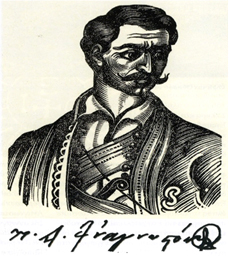 ANAGNOSTOPOULOS PANAGIOTIS
ANAGNOSTOPOULOS PANAGIOTIS
(Nickname: Ioannidis or Ioakim)
A pillar of the Filiki Eteria
Political Adviser of D. Ypsilantis
Panagiotis Anagnostopoulos was born in Andritsaina in 1790, where he gained his first education. In 1808, he moved to Smyrna with his family, and at the age of 20 he went to Odessa in Russia, where he worked as a clerk in the commercial centre of Thanassis Sekeris.
In Odessa he met the first members of Filiki Eteria (Skoufas, Tsakalov, Xanthos), he was initiated into Filiki Eteria by Skoufas and became a founding member of the Society. In 1843, Emmanuel Xanthos sent to the National Assembly a handwritten report which is kept in the National Library archives, under No. 9142, where, inter alia, he states that there were four people who met and begun working in Odessa in November 1814: Nikolaos Skoufas from Arta, Athanasios Firou Tsakalov from Ioannina, Panagiotis Anagnostopoulos from the Peloponnese and Emmanuel Xanthos from Patmos… After 1818 (Skoufas dies – Tsakalov moves to Italy) the pillars of Filiki Eteria stayed with Xanthos.
He initiated wealthy people into the Filiki Eteria (Panagiotis Sekeris, Asimakis Krokidas) contributing as economic boosters of the Society, and other major warriors (Anagnostaras, Dimitropoulos, Neofytos Doukas…). Therefore his contribution to the Society and the preparation of the big revolution of the Nation is considered invaluable.
Panagiotis Anagnostopoulos persuaded Dimitrios Ypsilantis to come to the Morea, and accompanied him from Metternich Austria to the revolutionary Greece, with passports issued by a Russian commander. Anagnostopoulos travelled under the identity of Sostopopoulos Athanasios, a salesman and Ypsilantins under the identity of Charitos, Director of the Trade Firm.
They arrived at the Morea on 19 June 1821 and he was the political advisor of D. Ypsilantis, so that he could not be easily disoriented by the Kodjabashis (Christian notables), being informed on their practices. We fight to live and make them also live (the Turks) under fair, human laws. We do not fight the Turks, their men, we fight the tyranny Anagnostopoulos said explaining the broad sense of the Greek struggle, placing it above any racial and national hatred. Due to this life attitude, both D. Ypsilantis and Anagnostopoulos himself were sidelined.
During the Kapodistrian period he was appointed temporary commissioner of Ilia and from 1831 to 1843 he was successively Governor of Sparta, Syros, Evia and Thyra. In 1843 he was appointed State Counsellor and later Prefect of Laconia and Messinia.
He died in 1854 in Athens by cholera, an epidemic disease spread to the capital from the British and French occupation troops.
AMPARIOTIS GEORGIOS
Proestos of Andritsaina and member of the Filiki Eteria
Ampariotis Georgios was born in 1740. He was a Proestos (Christian notable) in Andritsaina. He took part in the Orlov Revolt (1769) and after the failure of the revolt he fled to Mount Lykaion, fighting against the Turkish Albanians. In 1819 he was initiated into the Filiki Eteria by Polychronis Tzanetos and actively worked to prepare the independence struggle.
ANTONOPOULOS GEORGIOS
Merchant of Trieste. Member of the Filiki Eteria – Consultant of D. Ypsilantis
Political and Economic Actor of Nafplion
Georgios Antonopoulos was born in Andritsaina, Olympia in 1800. He firstly studied at the school of Andritsaina, and at the age of 12 he went to Trieste invited by his uncle Anastasios Antonopoulos.
He studied at the famous Greek School of Trieste, where he studied Greek history and literature and learned German and Italian.
In 1817, after the death of his uncle Anast. Antonopoulos, he took over with his brother the business management of Antonopoulos house. The house became a great commercial and banking business, importing and exporting goods through the port of Trieste.
In 1819 he was initiated into the Filiki Eteria, worked for the sacred purpose, and together with his brother offered great amounts to prepare the Greek Revolution.
In May 1821, when Dimitrios Ypsilantis -at his descent to Greece- arrived at Trieste, Georgios Antonopoulos set at the service of the revolutionary Greece himself and his property. He followed Dimitrios Ypsilantis, accompanied by Panagiotis Anagnostopoulos, as consultant, treasurer and aide de camp, and contributed significantly organising the administration and finance of the war.
After the occupation of Nafplion, he settled there, bought a house and married Irini, daughter of Stamatelos Andonopoulos, a merchant and member of the Filiki Eteria. His personality shined in Nafplion and he continued to provide services to the nation elected delegate to the National Assemblies, Senator, Nafplion Mayor and Consultant of the National Bank.
- Antonopoulos, as a Member of the Elders of Nafplion, welcomed in 1828 the first Governor of the liberated Greece, Ioannis Kapodistrias, with whom he collaborated constructively and in 1833 the king Otto.
He supported the opponents of Otto in the case of the conviction of Th. Kolokotronis and D. Plapoutas and the dismissal of the Bavarians. He also participated in the movement that abolished absolute monarch (03 September 1843) and voted for the Constitution, as a representative of Nafplion. He participated actively in the uprisings organised in Nafplion in 1861-62 for the Nation’s rights.
After Otto’s dethronement, he withdrew from political life and lived simply, despite being one of the prominent contributors to the political, economic, social and intellectual development of Greece.
He died in 1865 in Nafplion.
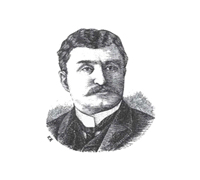 DIMITRIOS VARDOUNIOTIS (1847-1924)
DIMITRIOS VARDOUNIOTIS (1847-1924)
A renowned jurist, journalist, poet, essayist and above all, a historian
A prominent personality of Argos. He was born in Argos in 1847 and came from a very poor family. He studied law in Athens and practised until his death in his homeland. He lived an ascetic life and avoided social gatherings. He liked to work for endless hours. He devoted his whole life to his occupation and his writings.
Dim. Vardouniotis was a founding member and the first vice-president of the Association of Argos people “O DANAOS”, from which he resigned in 1900 after an argument with the president Christos Papaikonomos concerning the association’s goals, because he wished for the association to have a historical orientation, aiming to stimulate the public’s interest about the history of Argos.
Dim. Vardouniotis was actively engaged in politics and served as city council member in Sp. Kamouchos group for a single mandate of 1883-87, without being re-elected. He was a supporter of Th. Diligiannis, who he presented at his appearance in Argos. Later he became a supporter of Ch. Trikoupis. He had very good relations with Spilios Kalmouchos and supported him in his articles. He published the newspaper “Argos” from 1885 to 1889. After the Goudi coup, he belonged to moderate opponents of Venizelos. However, when the conflict between Venizelos and King Constantine broke out, he developed strong political action against Venizelos and as a result he was exiled in February 1918 at the age of 71 years in Mytilini, from where he returned a few months later, exhausted.
Vardouniotis’s intellectual work left a mark in Argos arts for 50 years. With an obvious romantic influence he wrote poems and short stories, which did stand the test of time. His work in the science of history is very significant and still attracts interest. His indefatigable historic research, performed methodically and responsibly helped establish the historical truth and gave us a lot of information on the revolution of 1821 and on many personalities of the era. “The destruction of Dramalis holds a special place, referring to the battle of Dervenakia. Moreover, he wrote about the trial of Kolokotronis, Bouboulina and other heroes and warriors of 1821. Other important works include Excursion to Mycenae, Aphneios Corinth, Phryni, Next to Erasinos, etc. Many of his works were published by the press in Argos, in Skokkos and Svoronos calendars and elsewhere. He often signed articles under the pen-names Esperos and Timon.
Vardouniotis had two children. He died in Argos in 1924.
GRIVAS GEORGIOS or SVIGGAS (Peratia, 1767 – Messolongi, 1826)
Georgios Grivas was the son of Christos Grivas descending from the historical family Grivas of Acarnania, whose influence was very important during the Turkish occupation, in the revolution of 1821 and in the free Greek state. He was killed during the last siege of Messolongi in 1826.
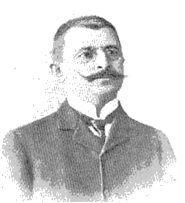 DIMITRAKOPOULOS NIKOLAOS
DIMITRAKOPOULOS NIKOLAOS
Lawyer – Politician – Minister of Justice
Nikolaos Dimitrakopoulos born in 1864 in historical Karytaina, Gortynia, where he completed primary school education. Then, he went to Athens, where he attended the 3rd Athens High School, the School of Philosophy (two years) and the Law School, from which he graduated with honours.
After his practical training and thesis he worked and quickly distinguished himself as a lawyer. In 1909, he was elected unanimously a Civil Law professor at the University of Athens, but he declined his election because he wanted to engage in politics.
He served as sergeant in the Greco-Turkish war of 1897 and he published his traumatic war experiences in a series of articles in the newspaper “Kairoi”.
His intense activity led him to engage in politics from 1906 until 1920. He was elected repeatedly MP and was entrusted with the Ministry of Justice by Eleftherios Venizelos on 06/10/1910. Dimitrakopoulos contribution, as Minister of Justice in the modernisation of the Greek legislation was impressive.
In May 1912 Dimitrakopoulos disagreed with the Prime Minister and submitted his resignation. He founded the “Progressive Party” and was elected MP at both elections of 1915. He did not take part in the elections of 1920 for health reasons, but his party elected 14 MPs.
He died in 1921 in Vienna, where he had gone for treatment, leaving behind extensive writings of legal and historical-political content.
The Library of Andritsaina hosts manuscripts from the personal collection of Nikolaos Dimitrakopoulos donated by Ms Christina Zissi, with the assistance of the Library Director, Dimitrios Pringouris.
ZARIFOPOULOS
The name of an Andritsaina family, whose patriarch was the wealthy notable Zarifis
Zarifopoulos Anagnostis
a hero of 1821.
Zarifopoulos Nikolaos
Brother of Andreas Zarifopoulos from Andritsaina. He was initiated into the Filiki Eteria in 1819, aged 35 years, by N. Poniropoulos. He fought as captain of Andritsaina men in the first battle given by Kolokotronis against the Turks outside Karytaina. When Dramalis descended, the alarmed politicians sent him with N. Poniropoulos to Zakynthos to request English protection. Maitland did not respond and after the destruction of Dramalis, the Greeks distanced themselves from such practices.
IATROPOULOS PANAGIOTIS or GIATRAKOS
A warrior and medical practitioner
A hero from Laconia. He fought and healed comrades with the medical knowledge he had as a practitioner. He served in the fight from beginning to end, having under his command a military force with which he fought in many battles and which he supplied by his own means. He sacrificed all his fortune in the fight.
He died destitute after 1846. The benefits committee ranked him posthumously an officer.
KANELLOPOULOS
Kanellopoulos Anagnostis
Warrior of the Greek Revolution
Kanellopoulos Anagnostis came from Andritsaina and was a merchant in Tripolitsa. He offered great service in the fight against the campaign of Dramalis in the Peloponnese with the following action: when the Peloponnesian Senate had no lead to supply the army to defeat Dramalis, Anagnostis Kanellopoulos came and offered ninety hundredweight lead that his brother Dimos sent from Malta to sell it. The bullets from the precious material crushed Dramalis’s army. Kanellopoulos also fought against Ibrahim. After the revolution, he was decorated for his services captain of the phalanx.
Kanellopoulos Dimos
Brother of Anagnostis Kanellopoulos.
Kanellopoulos Panagiotis
Warrior from Dimitsana. He was killed in the battle of Maniaki.
KOLOKOTRONIS (TSERGINIS) FAMILY
The Kolokotronis Clan is an old Greek family of “Klephts” with famous politicians and military officers. Its most important representative was the general Theodoros Kolokotronis
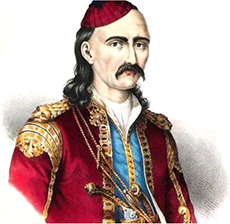
KOLOKOTRONIS THEODOROS (1770 – 1843)
The leading military figure of the war of 1821
“The Old Man of Morea”
Theodoros Kolokotronis was born in Ramavouni in Palaia Messinia on 5 April 1770. His father, Konstantis Kolokotronis was from Libovisi in Arcadia and his mother, Zabeta, ne Kotsaki, from Alonistaina. At age 15, he became a klepht and armatolos (a member of the militia), in the province of Lontari (Leontari). At age 20, he married Aikaterini Karoutsou, the daughter of Lontari notable Dimitris Karoutsos, who was killed by the Turks.
He collaborated with the chief klepht Zacharias, who had founded a kind of federation of Moria’s klephts and armatoloi. Th. Kolokotronis was the leader of klephts and armatoloi in Arcadia, at the heart of the Peloponnese, and was the most important link of the federation.
In 1803 he was declared wanted on orders of the Sultan, but remained uncaught. Starting in 1805, his persecution became exacerbated and Kolokotronis fled from Mani to Zakynthos (May 1806) to pursue the struggle against the Turks on land and sea until the end of 1808, first with the permission of the Russians and then of the French. In January 1809 he moved to Zakynthos, where he served in the first light infantry regiment of the Duke of York” as captain and then as major for two years. Thereafter and until 1821 he lived in Zakynthos, trading livestock, to support his family (wife, mother and 5 children), who also settled in Zakynthos in 1807.
In December 1818 he was initiated into the Filiki Eteria in Zakynthos. In January 1821 he returned to Morea and offered his services to his homeland and the revolution. His strategic mind, his bravery and his authentic patriotism shone in the military operations (Kalamata, Valtetsi, Tripolitsa, Akrokorinthos, Dramalis campaign, Anapli), in his attitude during the civil war (1823-1825) against the notables and politicians and through his ability to keep the flame of the revolution alive in the souls of ordinary people in very difficult times during the struggle.
He supported Kapodistrias, both for his election as Governor of Greece in the Trizina Assembly and in his effort to organise the state.
During the Regency, Kolokotronis was arrested (07 September 1833), as a conspirator against the throne and the Regents and was sentenced to death along with Plapoutas (26 May 1834). Reactions from within the country and abroad mitigated the sentence to twenty years and Otto, upon reaching the age of legal capacity, pardoned and released them (17 May 1835). Then, Kolokotronis was named General and received the office of State Counsellor.
He spent his last years with Margarita Velissari, from Chalkianika in Kalavryta, with whom he had a child in 1836.
His memoirs are a valuable historical source, dictated by Theodoros Kolokotronis to Tertsetis and titled Memoirs from the Greek war of independence 1821-1833.
“The old man of Morea” died from a stroke on 4 February 1843.
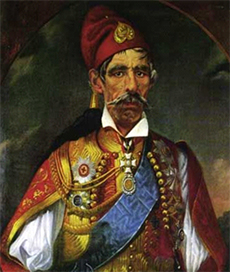 KOLOKOTRONIS IOANNIS OR GENNAIOS (1805 – 1868)
KOLOKOTRONIS IOANNIS OR GENNAIOS (1805 – 1868)
Theodoros Kolokotronis’s second son. Chieftain
Ioannis Kolokotronis was born in Stemnitsa around 1805. He grew up in Zakynthos, where his father had escaped and that is where he started his education. On 23 March 1821 he secretly went to Morea (Pyrgi in Ilia) with his brother Panos to offer his services to the fight. His first battle was in Pyrgos, during the raid of the Turks from Lalas and then he marched to Arcadia to meet his father, under whose orders he continued fighting. He was courageous and daring and he was named Gennaios, the Brave, thanks to his attitude during the siege of Tripolitsa.
Gennaios fought in Pyrgos and Tripolitsa, as already mentioned, in the battles of Patras and Western Greece, against Dramalis in Dervenakia (1822), against Ibrahim in 1825, against Kitahi in 1827 and in Attica to assist Karaiskakis. After Karaiskakis’s death and the dissolution of the Piraeus camp, he returned to Morea to continue the war against Ibrahim and help his father fight against Ottoman subjugation. During the civil war (1823-1825) he sided with his father.
In 1828 he married Fotini Tzavella, Kitsos Tzavellas’s sister. During the Kapodistrian era, he sided with the Governor of the country, Ioannis Kapodistrias, while later he opposed the Regency’s policies, fell into disfavour and remained in prison for quite some time.
Under Otto, he served as the aide de camp of the King (1836), Senator (1844) and Prime Minister (1862). When the revolution broke out, he refused, as a Prime Minister, to repress the revolution with force and this led to the dethronement of Otto. The anger of the people also turned against Gennaios, who was forced to flee abroad. He finally returned in February 1863, suffering from an incurable illness. He had two sons and five daughters.
In 1856, Gennaios collected and published numerous valuable documents and letters relating to the fight under the title “Greek Memoranda”, while his memoirs were published in 1955.
He died on 23 May 1868.
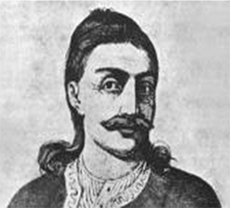 PANOS KOLOKOTRONIS (1798 – 1824)
PANOS KOLOKOTRONIS (1798 – 1824)
Th. Kolokotronis’s eldest son – Member of the Filiki Eteria. Chieftain
Panos Kolokotronis grew up in Zakynthos and in 1818, at age 20, he was initiated by his father into the Filiki Eteria.
He studied at the Corfu Academy to be a mathematician and knew the ancient Greek language, as well as Italian and a little French.
On 23 March 1821 he requested the authorisation from Zakynthos’s English authorities, for him and his younger brother Gennaios, to go to Morea. The English did not allow it and they were forced to flee secretly to Morea, where they developed a remarkable military activity.
They arrived in Ilia and took in the battle that took place in Pyrgos against the Turks from Lalas. They, they proceeded to Arcadia and met with their father. When Th. Kolokotronis went to Astros to welcome Dimitrios Ypsilantis, the Turks of Tripolitsa came out with strong forces against the Greeks. Panos Kolokotronis faced them with temerity. When Tripolitsa was captured by the Greeks, the people of Tripolitsa requested from Th. Kolokotronis with a special report to leave Panos as the leader of the civil militia and he agreed. The Peloponnesian Senate named him chiliarch and sent him as a representative to receive Anapli. He fought against Dramalis’s Turks and participated in guarding Spetses to prevent Turkish landings.
In February 1823 he married the daughter of Bouboulina, Eleni, in Anapli. After the Assembly of Astros, the Executive Body appointed Panos commandant of Anapli.
His political activity is linked to the dispute between politicians and the military, where he sided with his father (1823-1824). Specifically, when some MPs – friends of Mavrokordatos- sabotaged the work of the Executive Body and the Military, Panos Kolokotronis and Nikitaras reacted in both words and actions. Panos acted accordingly with the second executive body, the illegal Kountourgiotis government.
At the second phase of the civil war, Panos fought against the troops of Papaflessas and Makrygiannis in Messinia and after disbanding them, he went north towards Tripolitsa.
On 13 November 1824, on the way to Selimna, where his father was, he fell into a government ambush and was killed. Panos’s death had a serious impact on the “rebels” camp, as Th. Kolokotronis lost the will to continue fighting against the government and withdrew in Stemnitsa.
KOLOKOTRONIS MARKOS
Fighter from Limpovitsi. Cousin of Theodoros Kolokotronis. He was born in 1756. He fought in the Orlov Revolt and played a great role in 1779 in the killing of Albanians in Trikorfa. Despite his age, he fought against the Turks with his four sons. He was blinded due to old age and to the hardships of war. He died in December 1838 happy to have seen his homeland free.
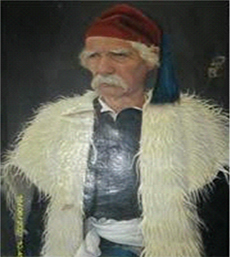 KRESTENITIS LYKOURGOS (Pyrgos Ilia 1793 – 1873)
KRESTENITIS LYKOURGOS (Pyrgos Ilia 1793 – 1873)
Member of the Filiki Eteria, warrior and politician
Krestenitis Lykourgos came from Pyrgos, Ilia and was the son of Ioannis Krestenitis, a notable from Pyrgos. He began his studies in Zakynthos and completed the Ionian Academy of Corfu. Prior to the Revolution, he worked as a teacher in Pyrgos. He taught the children about freedom and military tactics. He was initiated into the Filiki Eteria and worked for its dissemination. His activities put his life in danger and he was forced to hide from the Turks.
Once the fight began, he served under Charalambos Vilaetis, leading many men from Pyrgos and he participated in various battles in the Western Peloponnese. When Dramalis invaded, he was in the Argos region and influenced by the panic that quickly spread, he left with his companions to Pyrgos.
During the first phase of the civil war, Lykourgos Krestenitis was a political opponent of Th. Kolokotronis, due to his friendship with Andreas Zaimis. Upon the arrival of Ibrahim and the release of Th. Kolokotronis, Krestenitis was appointed by the government to the committee for the supply of the camp founded by Th. Kolokotronis in Makryplagi. He was elected delegate of Ilia to various National Assemblies.
Later, he served in various political positions and was elected several times an Ilia MP between 1844 and 1869. He was Governor of Kynetha province, Minister of Finance, of the Interior and Justice, President of the House and Senator. During his political career he was involved in several scandals relating to petty partisanship and corruption.
Lykourgos Krestenitis was married to Marigo Mavromichalis the eldest daughter of Petrobey Mavromichalis, which gave him political power, as the Mavromichalis clan was quite powerful.
He died in Pyrgos, Ilia in 1873
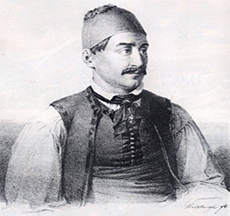 KOUNTOURGIOTIS GEORGIOS (1782 – 1858)
KOUNTOURGIOTIS GEORGIOS (1782 – 1858)
Politician of the Revolution and the Ottonian period
Georgios Kountourgiotis was born in 1782, the son of Anagnostis Kountourgiotis from Hydra. He was actively involved in public life both during the struggle and the first period of the free Greek state.
He participated in the Second National Assembly of Astros (1823) and was appointed President of the Executive Body, a position which he held throughout the civil war (1823-1824). During the civil war, he argued with Kolokotronis and other military men of the rival camp, which brought a heavy blow to the struggle.
In early 1825 the Parliament Body assigned him the responsibility of operations against Ibrahim, but his inexperience led him to fail and eventually to resign.
In the Assembly of Trizina (1826) he did not support the election of Kapodistrias as Governor of Greece and later brought intense opposition action against him.
Under King Otto, he served as Senator, Counsellor of State, President of the Cabinet, Minister of the Navy and President of the Kountourgiotis Government, which was formed on 8 March 1848, but, because he could not control the domestic and foreign issues of the country, he was replaced by a government under President Konstantinos Kanaris, on 15 October 1848.
In the remaining years of his life, he did not get much involved in politics, but remained loyal to Otto. He died in Hydra on 9 April 1858.
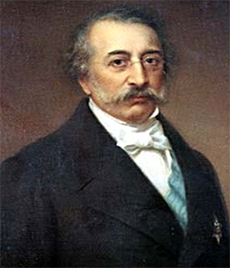 MAVROKORDATOS ALEXANDROS (1791 – 1865)
MAVROKORDATOS ALEXANDROS (1791 – 1865)
Politician, Diplomat, Leader of the “English” Party
Alexandros Mavrokordatos, son of the intellectual official of Danubian Principalities, Nikolaos Mavrokordatos, he received elaborate education and played an important role during the Greek Revolution and the Ottonian period.
He began his political career as private secretary to the ruler of Wallachia, Ioannis Karatzas (his uncle). Despite his opposition to the plans of the Filiki Eteria to immediately declare the Revolution (he belonged to the conservatives of the F.E.), he arrived in Messolongi on 22 July 1821, where he dealt with the administrative and military organisation of W. Greece and was elected President of the Senate. Right from the beginning, he diverged from the Peloponnesian notables and military, and from D. Ypsilantis and G. Karaiskakis.
He managed to become a nationwide figure through specific political actions such as: President of the First National Assembly of Epidaurus, Chairman of the Committee for the Preliminary Constitution of Greece, President of the Executive Body of the 1st Parliamentary Session, head of Political and War Affairs of W. Greece, responsible for organising the defence of Messolongi, Secretary of the Executive Body and Minister of Foreign Affairs of the 2nd Parliamentary Session, President of the Parliamentary body, leader of the “English” party, ambassador in Berlin and Munich.
Under Kapodistrias, he was appointed member of the “Panellinion” and Chairman of the Financial Frontistirion, but in 1830 he resigned and became leader of the opposition. Under Otto, he served as minister, ambassador and prime minister.
His political opponents considered that he was responsible for the defeat in Petta (1822), that he held the main responsibility for the civil war, and that he was the instigator of the murder of Kapodistrias, because his political and military choices were designed to serve personal interests and ambitions, as opposed to a common purpose. However, he has been recognised to have offered a clear political vision for the establishment of the Greek state and its modernisation to Western standards.
He died 1865 in Aegina.
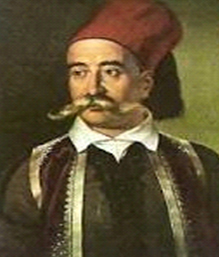 MAVROMICHALIS PETROBEY (1773 – 1848)
MAVROMICHALIS PETROBEY (1773 – 1848)
Leading figure in Mani and the Peloponnese.
The last Bey of Mani
Petrobey was the leader of the Mavromichalis clan, the last Bey of Mani and one of the most important political and military actors of the Greek Revolution of 1821. He was born in Mani in 1773. During adolescence, he was characterised by his abilities and the protection that he offered to klephts and during his rule as Bey of Mani, he also revealed his leadership skills with the influence he exerted not only on the Greeks, but also on the Turks.
In August 1818, at age 45, he was initiated in the Filiki Eteria, and later, he introduced in the society the major leaders of Mani. He expressed reservations about the starting time of the revolution, but, when he realised that the revolution had been prepared for large parts of the Greek population in psychological terms, he placed himself in the service of the liberation struggle. He took part in several military operations, such as: the occupation of Kalamata, defeating Dramalis, providing military aid to the besieged Messolongi, preventing Mani occupation by Ibrahim. His participation in the civil administration of revolted Greeks was also essential, as he undertook the following positions: President of the Mani Senate (1821), President of the Peloponnesian Senate (1821), Vice-President of the Parliamentary Body (1821), President of the Second National Assembly (1823), President of the Executive (1823), member of the Administrative Committee of Greece (1826), etc.
In the third National Assembly in Trizina (1827), P. Mavromichalis accepted the election of Kapodistrias as Governor of Greece and after the arrival of Kapodistrias, he was appointed member of the Presidency of the “Panellinion” and of the Senate. The amicable relations between Kapodistrias and the Mavromichalis family did not last for long, because the measures for the administrative organisation of the State caused the reaction of the Mavromichalis. The worsening of the situation led to the imprisonment of
Petrobey and to the murder of Kapodistrias by the son, Georgios and brother, Konstantinos, of Petrobey Mavromichalis (27 September 1832).
After the arrival of Otto, P. Mavromichalis, G. Kountourgiotis and A. Zaimis were appointed Vice Presidents of the Council of State and after the Revolution of 3 September 1843, Petrobey received the office of Senator.
He died in Athens on 17 January 1848.
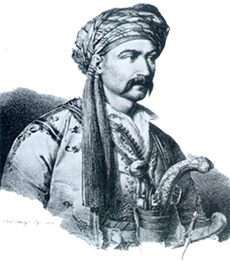 NIKITARAS OR NIKITAS STAMATELOPOULOS OR TOURKOLEKAS (1787 – 1849)
NIKITARAS OR NIKITAS STAMATELOPOULOS OR TOURKOLEKAS (1787 – 1849)
Member of the Filiki Eteria and major chieftain in 1821
Student and close associate of Kolokotronis
Nikitaras was born in Megali Anastasitsa (Nedousa) in 1787. He was the son of Stamatelos Tourkolekas and Sofia, ne Karoutsou, the sister-in-law of Kolokotronis and he was trained by Zacharias and Kolokotronis. In 1805, after his father, an armatolos, and his brother were murdered by the Turks, he followed his uncle Kolokotronis in the Ionian Islands. He was initiated into the Filiki Eteria in 1818 and was involved in the initiation of new members. In February 1821 he was in the Peloponnese, ready for the declaration of the Revolution. He took part in the liberation of Kalamata, in the battles of Valtetsi and Doliana (leader and winner), in the fall of Tripolitsa, in the siege of Anapli, in military operations in Roumeli, in the operations against Dramalis and Ibrahim.
During the civil war he sided with Kolokotronis. He was a close associate of Kapodistrias and was appointed Commander of the Peloponnesians and Head of the Civil Guard of the Peloponnese. For the Fourth National Assembly of Argos (1829), he was representing Leontari.
He was pushed aside during the Ottonian period. In December 1839 he was arrested for allegedly belonging to the “Filorthodoxi Eteria”, which was directed against Otto, he was brought to trial and was acquitted but remained in prison Aegina for 14 more months. After the Revolution of 1843, Otto decorated him with the rank of Major General and in 1847 he became a Senator. However, he was incapable for action.
He died in Piraeus in 1849, blind and destitute and was buried in Athens.
PAPALEXIS
Chief Proestos of the Peloponnese – Cleric – Fighter
Papalexis originated from the village Ambeliona of Andritsaina and was the son of Panagiotis Kanellos or Kanelletos or Kanellakis and Krinio. His Christian name was Alexis and he was a cleric. He stood out for his natural wit and courage. He learned Turkish, won the favour of the Valide sultan and was appointed Ba Kodjabashis, meaning “Head of the Notables” in Morea, a post that offered him great power, influence and wealth. He was also appointed vekil in Constantinople several times.
He returned to Morea in 1818 and held the position of Mora ayan, with Theodoros Deligiannis when the Turks began to suspect the preparations for the uprising. Papalexis reassured the Turks offering valuable service to the nation, in preparation for the liberation movement.
When the Revolution began, the Turks imprisoned him along with other notables and clerics, most of whom died in wretched conditions. Papalexis died in 18 September 1821, a few days before the fall of Tripolitsa.
PELOPONNESIAN SENATE
The Peloponnesian Senate was the administration body established by the rebellious Greeks of the Peloponnese in May 1821, i.e. the creation of a central authority with a local character.
In the last ten days of May 1821 notables and high priests of the Peloponnese gathered, upon invitation of P. Mavromichalis and the Deligianni family, in the Monastery of Kaltezes, on the border of the current prefectures of Arcadia and Laconia, where they voted for the establishment of the first large senate, which took the name “Peloponnesian Senate” (26 May 1821).
The Peloponnesian Senate that would exercise its duties until the fall of Tripolitsa, on the next day, 27 May 1821, moved to the Monastery of Chrissopigi in Stemnitsa.
Military and the people’s representatives were completely absent from the Kaltezes meeting and this reveals both how one-sided was the attempt to solve the problem of the administration and the causes of the onset of civil and military friction.
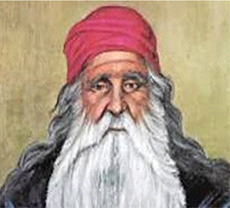 PETROVAS MITROS OR MITROPETROVAS (1745 – 1838)
PETROVAS MITROS OR MITROPETROVAS (1745 – 1838)
Fighter in the Orlov Revolt and the Revolution of 1821
Loyal follower of Kolokotronis
Mitros Petrovas or Mitropetrovas was born in 1745 in Garatza, Messinia. He developed military activity against the Turks during the Orlov Revolt in 1770, with Konstantinos Kolokotronis (father of Theodoros) and worked on preparing the revolution.
When the struggle started, he sided with Th. Kolokotronis and followed him in Arcadia. Despite his advanced age he fought heroically until the conclusive victory in the battle of Valtetsi. He participated in the siege of Tripolitsa, in various conflicts and against Ibrahim (1825).
In 1823 he received the rank of chiliarch and during the civil war he remained a loyal follower of Kolokotronis, and was thus imprisoned with his brother-in-law, Giannakis Gritzalis, by the G. Kountourgiotis government, in the Monastery of Prophet Elias in Hydra (1825).
He was an opponent of Regency and following Kolokotronis’s conviction he led the mutiny of the Maniots against the Bavarians (1834) and later the uprising of Messinia. Due to his participation in the anti-government movement he was sentenced to death, but the penalty was not executed due to his advanced age. He was granted amnesty some years later and retired to his hometown, where he died in 1838.
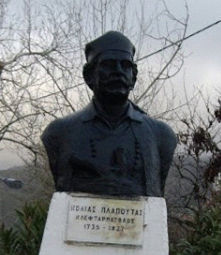 PLAPOUTAS KOLIAS (1735 – 1827)
PLAPOUTAS KOLIAS (1735 – 1827)
Klepht-Armatolos, Fighter during the Orlov Revolt and the Revolution of 1821
Kolias Plapoutas was born in the village Soulimas of Trifylua in 1735 and at age 18 was forced to become a klepht in the mountains of Gortynia, after killing a Turk.
He was associated to other renowned klephts of Morea (Zacharias, K. Kolokotronis, Petimezis family, etc.) and participated in the Greek revolt of 1770 (Orlov revolt) and to the persecution of Turkish Albanians.
Following the outbreak of the fight, Plapoutas, due to his advanced age, was involved in recruiting soldiers and securing ammunition for the needs of the struggle.
He died in the Monastery of Prodromos in Stemnitsa in 1827, where his children had transferred him for safety.
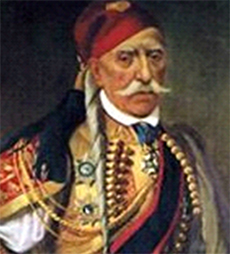 PLAPOUTAS DIMITRIS or KOLIOPOULOS (1786 – 1864)
PLAPOUTAS DIMITRIS or KOLIOPOULOS (1786 – 1864)
Member of the Filiki Eteria and the Greek Revolution
A prominent military figure of the Greek Revolution, the son of Kolias Plapoutas and a close partner of Th. Kolokotronis. He was born in Paloumba, Gortynia in 1786. In 1806, during the persecution of the klephts of Moria by the Turks, he was held hostage, but fled to the Ionian Islands once released. In 1811 he served in Zakynthos in the British army as a centurion. In 1818 he was initiated into the Filiki Eteria and in turn initiated new members in the society once he returned to his hometown, in order to prepare the fight.
Plapoutas spearheaded the uprising in Gortynia and later stood at the forefront of the operations in the Peloponnese, under the command of Th. Kolokotronis. It is worth mentioning his participation in the battles of Levidi, Karytaina, Piana, Valtetsi, Lalas and in the siege of Tripolitsa during the first year of the Revolution. He later contributed to the siege of Patras, in repelling Dramalis (1822) and Ibrahim (1825). During the civil strife, Plapoutas initially remained loyal to Th. Kolokotronis, but after the assumption of power by G. Kountourgiotis, he tried to reconcile the warring factions.
He supported the policy of Kapodistrias and received the rank of Colonel. He was elected delegate of Gortynia in the 4th National Assembly of Argos (1829) and a member of the seven-member commission to communicate with the Governor. In 1832 he travelled to Munich, as member of a Commission, to pay his respects to the new King Otto. In 1833, Plapoutas was accused by the Regency, as was Kolokotronis, of suspected conspiracy against the legitimate authority. He was arrested, put to prison, tried and sentenced to death on charges of treason. Otto reduced his sentence and he was eventually pardoned and released from prison on 29 May 1835.
In the following years he served as delegate to the National Assembly of Athens, was awarded the title of honorary aide de camp of the king and served as Senator. He died in his hometown in 1864.
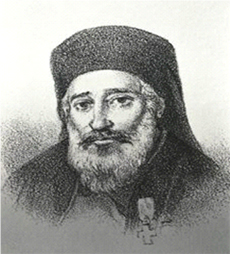 FRANTZIS AMVROSIOS (1781-1851)
FRANTZIS AMVROSIOS (1781-1851)
Cleric – Member of the Filiki Eteria and Warrior of 1821 – Chronicler – Intellectual
The militant cleric
Frantzis Amvrosios was born in Mesorougi, Kalavryta in 1781 and studied at the Monastery of the Great Cave, where he became a monk at a young age. He was initiated into the Filiki Eteria in 1819 and worked successfully for the preparation of the Revolution and the start of the Struggle.
He participated in the meeting of Vostitsa (Jan. 1821) and faced the Turkish administration with diplomacy. As Protosyncellus in Kyparissia, he achieved the implementation and spread of the revolution in the southwest Peloponnese. He participated in the Kaltezes meeting (May 1821), as the representative of the “Christianoupoli” Metropolis (Trifylia) and became a member of the Peloponnesian Senate and a member of the “National Parliament”. In 1827, he became representative at the Third National Assembly of Ermioni.
Apart from administration, Frantzis played a major role in battles in Trifylia, Messinia and Arcadia. His presence was significant in the Lalas battle, the siege of Neokastro and in Maniaki.
He sided with the faction of Th. Kolokotronis and for this reason he was persecuted by the opposing forces during the civil strife and was eventually imprisoned by the Regency regime (1834).
After his release, he wrote his four-volume “Compendium of the History of the resurrected Greece” recounting events from 1715 to 1835. This is an important source for the struggle in the SW Peloponnese.
He died in Kyparissia in 1851
CHRISTOPOULOS FAMILY
Warriors of 1821
ANASTASIS CHRISTOU [CHRISTOPOULOS]
Founder of the Family
Anastasis Christou was born in Andritsaina in1700. He was literate, wise and had strong patriotic feelings. He was the Proestos (notable) of the Fanari province and organised its administration. It is reported that he was a teacher at the School operating in Andritsaina during the Turkish rule, which was burned after the Orlov revolt. He took part in the Revolution of 1769-1770 (Orlov Revolt) rising up the entire Fanari province and sending many Olympians to help Mani. After the failure of the revolution, he was captured by the Turks and was impaled or hanged in Andritsaina (1770).
CHRISTOS ANASTASIOU [CHRISOPOULOS]
Son of Anastasis
Anastasis’s son, Christos Anastasiou, after the failure of the revolution of 1769-1770 (Orlov Revolt), fled to Zakynthos with his brothers (Ioannis and Tzannetos), while the family property was confiscated. They returned to Andritsaina later when amnesty was granted and the confiscated paternal estate was repaid.
He was literate, virtuous and a fervent patriot. He became Proestos of the Fanari province and demonstrated significant activity, including: founding a school in Andritsaina (1783), organising craft workshops, promoting commercial activities, cultural life and a spirit of revolt.
During the struggle, he served as registrar for the revenues and expenses of the Fanari province and supplied the military of his province.
Sons of Christos
Anastasis, Georgakis, Zarifis, Panagiotis, Tzanetos, Charalambos
CHRISTOPOULOS ANASTASIS
Anastasis was born in Andritsaina and was the son of Christos Anastasiou Christopoulos. He first studied at the School of Argos and then in Constantinople, Pisa and Bucharest, law and philosophy. He worked as a teacher in Bucharest and participated, as member of the Sacred Band, to the battle of Dragatsani with Alexandros Ypsilantis.
Following the Revolution, he returned to Greece and became a judge, reaching the grade of judge of the Court of Appeals. He was the author of a grammar book for the Greek language and of comments on Isocrates.
He died in Athens in 1854.
CHRISTOPOULOS GEORGAKIS
Member of the Filiki Eteria and 1821 warrior
CHRISTOPOULOS PANAGIOTIS
Member of the Filiki Eteria and 1821 warrior
Prior to the Revolution, Panagiotis was a merchant in Constantinople, where he was initiated into the Filiki Eteria. With the start of the revolution, he went to Morea to take part in the battles. In 1836 he settled in Kalamata where he practised law.
CHRISTOPOULOS TZANETOS
Member of the Filiki Eteria and Captain
Tzanetos was born in Andritsaina in 1788 and was initiated into the Filiki Eteria in Constantinople, where he was a merchant. He left for Morea before the revolution and assumed the leadership of the Filiki Eteria members in the Fanari province.
On 25 March 1821 he officially declared the revolution in Olympia and attacked, along with Th. Kolokotronis, the Turks of his region. He participated in many battles both in Morea and in Roumeli, in a leading position and under the orders of Plapoutas and Nikitaras. He attended all National Assemblies, representing the Fanari province.
Upon liberation, he became a Phalanx Colonel and was awarded the Cross of the Saviour. He died in 1878.
CHRISTOPOULOS CHARALAMBOS
Public Servant-Author – Politician
Charalambos Christopoulos was born in Andritsaina, probably in 1809. He was the youngest son of Christos Anastasiou and Aggeliki, ne Nikoli Tzanetos, sister of the founder of the Library of Andritsaina, Konstantinos Nikolopoulos.
He went to school in Aegina and attended as a listener in the University of Athens. He then studied law in Paris. He returned to Athens and worked in the Ministry of Interior. He presented himself to the elections for the first time in 1850 and was elected MP for Olympia.
He was appointed Minister of Ecclesiastical Affairs and Public Education from 1855 to 1859, when he resigned. In 1861 he became Minister of the Interior for the same government and resigned after a year. He was re-elected to the Parliament representing the province of Olympia in the parliamentary elections of 1865 and was appointed Minister of Foreign Affairs, Minister of Ecclesiastical Affairs and Public Education. He was, in his capacity as Minister of Education, a founding member of the Gymnasion of Andritsaina, one of the oldest secondary schools of the Greek State.
He died in Athens on 8 April 1871.
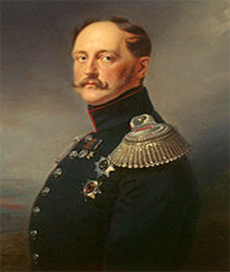 NIKOLAI I PAVLOVICH (1796 – 1855)
NIKOLAI I PAVLOVICH (1796 – 1855)
Tsar of the Russian Empire (1825-1855)
Nikolai I Pavlovich was born in 1796 , the third son of Paul I of Russia and tsarevna Maria of Wirttemberg. At age 5 (1801) he experienced the painful experience of the murder of his crowned father. He pursued military studies, which revealed in him a particular inclination and commitment to military discipline. At the same time, he showed a keen interest in music. In 1814, he joined the Russian army. He married the Prussian Princess Charlotte, who was converted to Orthodoxy and took the name of Alexandra.
He assumed the imperial office after the death of Alexander I (1825), bypassing the succession rights of his elder brother Konstantin Pavlovich (Viceroy of Poland), who renounced any claim. His domestic policy was characterised by extreme absolutist ideas and he established a very authoritarian bureaucratic regime. His subjects called him “iron tsar” and “executioner”. The foreign policy of Nikolai I strongly influenced the international developments in the East and contributed to the successful outcome of the Greek struggle for independence. Specifically, the Russian monarch strongly supported the anti-liberal principles of the Holy Alliance, but also appeared as the self-appointed defender of Orthodoxy, a fierce opponent of Islam and supporter of the independence of the Balkan peoples, who were subjugated by the Turks, to decisively address the eastern aspirations of England and France. As part of this policy, Russia was involved in the famous naval battle of Navarino and the victorious, for Russia, war against the Ottoman Empire (1828-29). A result of this was the recognition of the Greek national independence from the High Porte (Turkey) by the treaty of Adrianople in 1829.
He died in 1855 during the Crimean War (1853-56), which ended in defeat for Russia, much to the responsibility of Nikolai I, who prepared and conducted it, as this war was a result of the competition of Russia with the other Great Powers (England-France).
SOURCES
- Dictionary of the Greek Revolution of 1821, Christos Stassinopoulos
- International Biographical Dictionary, Ekdotiki Athens
- Great Greek Biographical Dictionary, Vovolinis
- Archival History and Culture Library of Argos
- Andritsaina Dimitrios Pringouris
- Modern and Contemporary History V. Skoulatos, N. Dimakopoulos, S. Kondis
- Great Greek Encyclopaedia, Drandakis
- Biographical Dictionary of Messinia, N. Karampelas
- Commemorative Issue for the 85 years of the Gymnasion of Andritsaina
- The Internet




